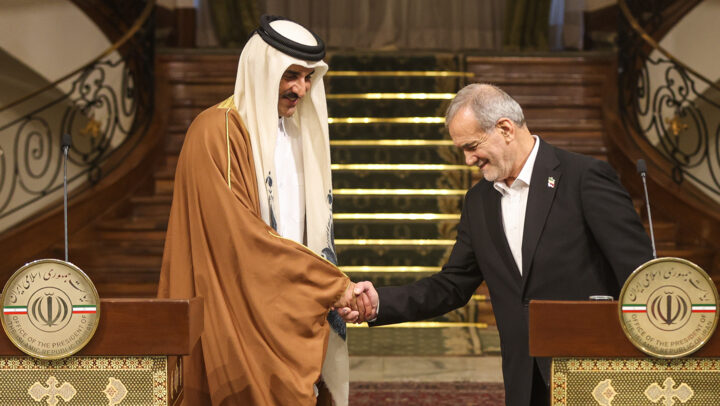Iran Reinforces Commitment to Neighborly Relations and Regional Stability
In a series of diplomatic engagements underscoring Iran’s foreign policy priorities, Foreign Minister Abbas Araghchi has reiterated the nation’s dedication to fostering strong relationships with neighboring countries. This commitment aligns with Iran’s broader strategy to enhance regional cooperation and stability.
Emphasis on Neighborly Diplomacy
During a recent visit by Qatar’s Emir, Sheikh Tamim bin Hamad Al Thani, to Tehran, Minister Araghchi highlighted the significance of neighborly ties. He stated, “Our neighbors are our priority,” following productive discussions on bilateral relations and regional issues. This visit aimed to strengthen the partnership between Tehran and Doha across various sectors.
President Masoud Pezeshkian echoed this sentiment, emphasizing that expanding relations with neighboring states is a definitive policy of Iran. The official reception for the Qatari delegation included high-level meetings focused on mutual interests and regional cooperation.
Strategic Foreign Policy Priorities
Minister Araghchi outlined Iran’s foreign policy priorities, placing neighboring countries at the forefront. He emphasized that the surrounding region offers numerous opportunities in terms of national interests and security. This approach continues the momentum initiated during the administration of the late President Ebrahim Raisi.
Beyond its immediate neighbors, Iran aims to expand diplomatic efforts to regions such as Africa, Latin America, and East Asia. These areas, previously receiving less attention, present valuable opportunities for economic and political collaboration. Additionally, Iran seeks to strengthen relations with countries that supported it during challenging times, particularly those that assisted in circumventing sanctions.
Emerging powers, including India, South Africa, Brazil, and Turkey, are also on Iran’s radar for enhanced engagement. These nations play significant roles in the international arena, and fostering ties with them aligns with Iran’s strategic interests.
Managing Tensions with the United States
Regarding the United States, Minister Araghchi clarified that Iran does not seek to resolve longstanding conflicts but aims to manage and mitigate tensions. He noted that many disputes stem from fundamental differences in perspective, and while resolving them entirely may not be feasible, diplomacy can help reduce associated costs and pressures on the Iranian populace.
Red Lines and Regional Security
Iran has firmly stated that any threats to the territorial integrity of its neighbors or attempts to redraw regional boundaries are unacceptable and constitute a red line. Minister Araghchi emphasized that regional peace and stability are not merely preferences but pillars of Iran’s national security. This stance reflects Iran’s commitment to maintaining the current geopolitical landscape and preventing external interference that could destabilize the region.
Balancing Relations with Global Powers
The Iranian administration, under President Pezeshkian and Minister Araghchi, is pursuing a balanced foreign policy. This strategy involves maintaining and strengthening ties with traditional allies such as Russia and China while also exploring avenues to improve relations with Western nations. The goal is to alleviate economic sanctions and attract foreign investments critical for addressing Iran’s economic challenges. However, this approach requires careful navigation of historical mistrust and current geopolitical complexities.
Challenges and Regional Dynamics
Despite Iran’s proactive diplomatic outreach, the region faces significant challenges. The recent collapse of Bashar al-Assad’s regime in Syria, a key ally of Iran, has disrupted Tehran’s influence in the Middle East. This development has undermined Iran’s “axis of resistance,” affecting its strategic depth and forward defense strategy. The loss of Syria as a conduit to groups like Hezbollah has compelled Iran to reassess its regional policies and adapt to the shifting geopolitical landscape.
Conclusion
Iran’s current foreign policy underscores a strategic emphasis on cultivating robust relationships with neighboring countries to enhance regional stability and security. By prioritizing neighborly diplomacy, managing external tensions, and balancing global alliances, Iran aims to position itself as a central player in fostering a cooperative and secure regional environment.
Do follow gulf magazine on Instagram
for more information click here



